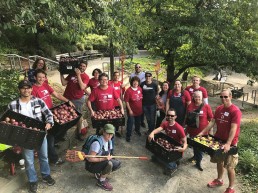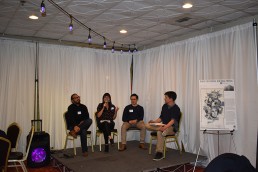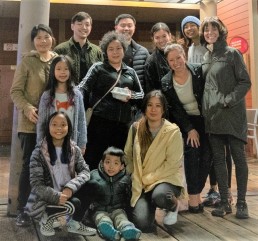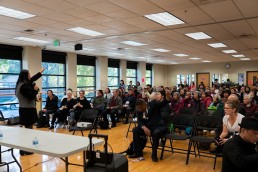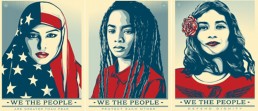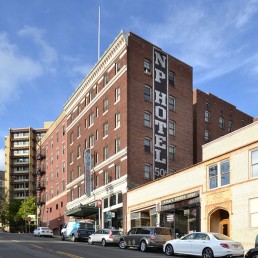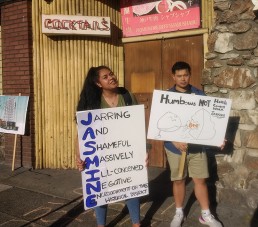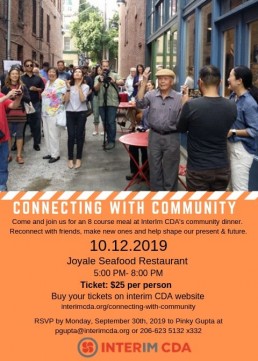The continuing legacy of volunteers in the Danny Woo Community Garden
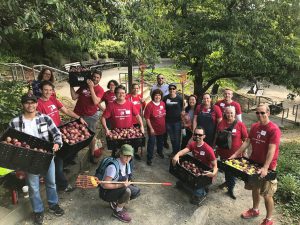
There is no community garden without community.
The Danny Woo Community Garden is a sanctuary to its users in the Chinatown-International District, and it is an ever-changing space that demands constant maintenance and tender loving care. Its evolution and perseverance over the past four and a half decades are due to those dedicated groups and individuals who believe in the inherent value of green public space in the Chinatown-International District and – most importantly – aren’t afraid to get their hands dirty. From the stairs, to the benches, to the artwork, almost every structure in the historic garden not built by a gardener was built by volunteer students or volunteer contractors. Even the seed-to-plate curriculum we teach in the Danny Woo Children’s Garden was created by the thoughtful work of a volunteer educator. It’s in this spirit that has kept the garden around over the years, and it’s in this spirit that the garden was created in 1975.
They probably didn’t call themselves volunteers back then but galvanized by the Asian American activist movement in the ‘60s and ‘70s, the first iteration of the garden was built by young people who had a vision for justice and the willingness to work. Facilitated by an innovative partnership between landowner Danny Woo and neighborhood activist “Uncle Bob” Santos, the humble hillside of weeds was transformed into a terraced oasis for neighborhood elders to grow vegetables, share food, and make friends.
Today we continue to value our partnerships with the many volunteer groups that visit and help in the garden, and we certainly couldn’t maintain the vast 1.5-acre footprint without them. Since January of 2019 we have hosted over 500 volunteers, which range from interested individuals, college classes, large foundations, and neighborhood groups. We would like to publicly thank them all for their friendship, support, and hard work. Here we’d like to take the opportunity to highlight just four of our volunteer heroes:
THE GATES FOUNDATION
On June 22nd we hosted the Gates Foundation for their Foundation Day of Caring. The Seattle-based foundation is the largest private philanthropy in the world, and we had the amazing opportunity to host CEO Susan Desmond-Hellman herself, along with 20 employees. While Susan was enthusiastically weeding, deep amongst a pile of blackberry bramble and bindweed, she listened to us tell her about the current struggles facing our low-income immigrant community and the importance of keeping healthy green space, affordable housing, and culturally appropriate social services in the neighborhood. Working with an organization like the Gates Foundation is incredibly important for the survival of programs like the Danny Woo Community Garden, and we are grateful for their continued support of the garden and of many of the programs at InterIm Community Development Association.
THE MISSION CONTINUES
The Mission Continues is a non-profit organization that serves veterans and connects them to meaningful community service projects. We are incredibly lucky to work with veteran volunteers who bring boundless enthusiasm and fun into the garden for each service project. Linh Thai, the City Impact Manager for Seattle, Tacoma, and Portland, has worked in the International District for many years. He brings individuals and families associated with veteran groups like Vets in Tech and Code Fellows to do a lot of literal heavy lifting in the garden and does a lot of the physical work himself! Since 2017 Linh and others have been our most consistent volunteer partners who bring not only people power, but donations and resources as well.
CITY FRUIT
The Danny Woo Community Garden is home to one of the most diverse mature fruit orchards in Seattle. With over 60 Asian pear, plum, apple, and cherry trees, we need a whole lot of help maintaining the orchard. City Fruit is a non-profit organization that helps care for urban fruit trees, provides classes, and brings volunteers to prune, harvest, and nurture trees so that no food is wasted. They volunteered twice in September, harvesting over 500 pounds of apples and pears from our trees. They were all given to gardeners or donated to local food banks, including ACRS Food Bank.
BOY SCOUTS TROOP 254
This Boy Scouts Troop is based in the Chinese Baptist Church in Beacon Hill, under the leadership of Scout Master Tim Louie. We are currently the site of two Eagle Scout projects from this troop. Jiawei Hu decided to do his Eagle Scout project in the garden and re-build stairs in a neglected and steep section near the entrance on Washington St. He said he wanted to do a project somewhere where it was needed, and that it would be an honor to give back to a beautiful community garden that serves a large group of elderly folks. “I hope the stairs we built will encourage more people to look after the well-being of the garden and make it a more welcoming place,” he said. “The new stairs will be much safer for the elderly gardeners to walk on, and so I hope walking on our stairs will make their day.” Nathaniel Wai, another Eagle Scout with Troop 254, is currently re-building a lookout structure in the garden to rebuild one that was first created in the early 90s by University of Washington students.
This beloved public space would not be possible without the support and efforts of volunteers, who have been responsible for the building and upkeep of the garden since young Asian American activists carried heavy timbers up the slopes to create the garden terraces. It has truly been made from the blood, sweat, and tears of hardworking people for almost 45 years!
The Danny Woo Community Garden hosts community volunteer days every first Saturday of the month. Join us for our next workday on October 5th 10:00 AM – 1:00 PM. Bring a water bottle and wear close-toed shoes. For more information visit www.dannywoogarden.org or email us at volunteer@interimcda.org.
Seattle triples healthy food vouchers for low-income families
Seattle plans to expand a program that provides low-income families with vouchers to buy fruits and vegetables.

SEATTLE — Next year Seattle will triple the number of participants in its healthy foods program, allowing thousands more people to receive fruit and vegetable vouchers.
The Fresh Bucks expansion, which was announced Thursday, was made possible by $2 million in funding that was included in the 2020 budget. It’s paid for through the city’s sugary beverages tax.
“Overall, it might seem to some of us that it’s not a ton of money,” said Sharon Lerman, food policy and programs manager for the Seattle Office of Sustainability and Environment. “But for people struggling to make ends meet, that $40 a month can be the difference between them being able to eat fruits and vegetables and feed them to their kids and family or not. And we hear that again and again from customers.”
She believes the program expansion becomes even more important after the Trump administration announced it would tighten work requirements for the Supplemental Nutrition Assistance Program (SNAP) or food stamps. This will cause thousands in Washington to lose their benefits.
Nearly 77,000 Seattle residents and 929,000 Washington residents benefit from the SNAP, according to the city.
The changes apply to adults between 18 and 49 years old who are not disabled and do not have children. States can currently waive the work requirements to help address areas with high unemployment, though these changes will make those waivers more limited.
Fresh Bucks do not come with a work requirement, Lerman said.
“We know that many working people in Seattle are struggling to make ends meet, so the idea of a work requirement is absolutely counter to everything we stand for as a city government,” she said.
Residents who make 80% or less of the area median income are eligible for Fresh Bucks. For a family of four, that’s $88,250 per year.
Eliza Guan of InterIm Community Development Association helped sign up seniors Thursday in the International District. Several hundred showed up.
“Not only does it provide fresh fruits and vegetables for the residents that live in Chinatown, but it also gives them the opportunity to come out of their apartment buildings, meet new friends and go to the store together, which is a great experience,” she said.
The story published in the King5 news channel.
https://www.king5.com/article/news/local/seattle/fresh-bucks-program-expansion/281-c139f537-7a44-4942-a062-84969037b6e8?fbclid=IwAR1C9zYi0KEwDedxKTgYLi8mdSsYNc7Lj4Bz6XbqUPkzBMGc5tRMo2EOXqU
InterIm’s Corner: Celebrating community with InterIm CDA

InterIm CDA hosted the second annual fall dinner ‘Connecting with Community’ on October 12th at Joyale Seafood restaurant.
The evening brought together 150 of InterIm CDA’s friends and supporters and we were honored to have the generation of activists who have dedicated their lives for decades fighting for justice and equity for the community, together with our young and upcoming activists who are engaged in fighting for the community.
The program began with a panel discussion titled ‘Continuing the Legacy of Activism’. A panel of three young activists in Seattle, Drag and Drop, owner Ryan Catabaya, Vanishing Seattle, founder Cynthia Brothers, Asian Counseling and Referral Service, civic engagement program manager, Joseph Lachman, and facilitator InterIm CDA, equitable development policy analyst, Derek Lum.
In another session, titled ‘Thriving through the activism’, the staff of InterIm CDA talked about their experiences while working for the community. The event was concluded with activ-ism stories shared by our long-time activists Francisco Irigon, Sharon Maeda, Matt Chan, Leslie Morishita, and State Representative Sharon Tomiko Santos.

The stories of heroic activism undertaken by the leaders present in the room together with stories shared by the younger generation of activists provided an opportunity to all present to be ener-gized, engaged and understand that activism lives on and that InterIm CDA will continue to carry on the legacy of our beloved Uncle Bob.
It was a great night of connecting with old and meeting new friends. InterIm CDA will be hosting the Connecting with Community Dinner on October 15th, 2020.We are excited to once again have the honor of bringing together the activists in the community to continue and advance our fight for justice and equality.


This content was sponosored by InterIm CDA.
InterIm’s Corner: The power of community organizing

To help our community stand up to the daunting threats of gentrification and displacement, I, Derek Lum, was brought on as InterIm’s Equitable Development Policy Analyst. My work centers around advancing policies in a way that amplifies the voices and interests of our most vulnerable community members, and those most impacted by the threat of displacement, including low income, limited English speaking, immigrants, refugees, elders, and more.
I work on a variety of fronts including hosting neighborhood forums, facilitating neighborhood issue discussion groups for residents, encouraging residents to show up at gatherings and events related to displacement, challenging city leaders to produce housing and transportation plans which will work for our community, and connecting community members to opportunities to advocate for equitable solutions to neighborhood issues as they see fit.
These days, I’m attending many resident gatherings to build relationships and to understand people’s concerns and challenges to inform my work. Finally, I collaborate with partner organizations and allies to bring city, state, county, and federal solutions to issues impacting low income immigrants and refugee communities. Every aspect of my work is underpinned by the power of community organizing.
The rallying cry, “Humbows Not Hotdogs!” will forever be linked with the struggles of community activists led by InterIm and Bob Santos, fighting against the King Dome and for the future of the International District in the early 1970s.
In those days, the fight was against a new sports stadium and the associated threats of gentrification and displacement. They’d seen how the construction of new sports stadiums had wiped out other poor, inner city ethnic neighborhoods throughout the country. The King Dome was built, but the power of community organizing was ignited and InterIm went on to lead decades of organizing, advocacy, and development, to protect and revitalize the neighborhood, especially on behalf of its low income, elder, immigrant residents and small mom and pop business owners, who built the neighborhood. Thanks in part to our early community activists, the ID continues now as a vibrant cultural community, a real neighborhood, that supports a mix of residents including low income elders and families, and where new immigrants and refugees can find a welcoming first landing place.
Today, with Seattle’s rapid growth and booming economy, the ID’s location next to downtown and the regional transit hub, and lots of development potential resulting from upzones that allow taller buildings, the neighborhood is facing an unprecedented onslaught of large-scale speculative developments. It’s not one big project that we’re facing now, but lots of private individual developments, whose cumulative impacts threaten to wipe out the ID as we know it. These sorts of developments, driven by profit, and not by serving the community, fuel rising property values and rents that in turn push out low income residents, small mom and pop businesses, community organizations and cultural institutions, that are the heart and soul of the neighborhood.
InterIm is not against development, nor are we against market rate development. InterIm evaluates new developments through the lens of equitable development – development that ensures everyone participates in and benefits from the neighborhood’s growth, especially low-income residents, immigrants and refugees, communities of color, and other marginalized groups at risk of being left behind or displaced. InterIm seeks development outcomes that prevent residential, commercial, and cultural displacement; advance economic mobility, security, and opportunity for the community; support and acknowledge local history and culture; promote transportation mobility and connectivity; and enhance health and safety. InterIm seeks development processes that exemplify transparency and accountability to the community; address historic and current racial and social injustice; advance community self-determination; and preserve community dignity and culture.
As I proceed in my new role at InterIm, I welcome the opportunity to meet with those who share our concerns about displacement, and values around equitable development. If you are a low-income renter in the neighborhood, interested in being involved in community organizing, I’d love to hear from you! Feel free to reach out to me at dlum@interimcda.org. See you around the neighborhood!
This content was sponsored by InterIm CDA.
InterIm’s Corner: A glimpse of work done by InterIm CDA in Chinatown/International District
This is a photo essay of some of the recent work done by InterIm CDA, including through their housing services programming, WILD programming and civic engagement programming. This content was sponsored by InterIm CDA.


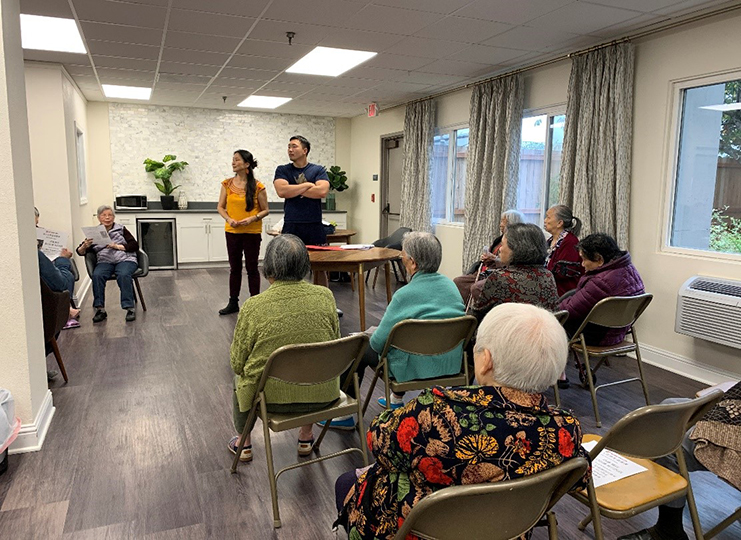


InterIm’s Corner: InterIm CDA condemns new immigration rule, calls on lawmakers to oppose it too

Dear friends, family, and community,
Today, InterIm is expressing it’s opposition to the Department of Homeland Security’s changes to immigration law. The change in “public charge” law will go into effect on October 15, 2019. This rule will make attaining a green card or U.S. citizenship more difficult for legal immigrants if either themselves or family members rely on public benefits such as food stamps, Medicaid, Medicare, and Section 8 rental assistance vouchers. This rule is extremely harmful to low-income immigrants and refugees, is meant to discourage new immigrants from coming to the U.S and aims to discourage current immigrant residents from using the programs they are entitled to.
Nationally, about 1.1 million Asian immigrants live in families earning under 125% of the poverty line, and over 80% of Asians and Pacific Islanders who received their green cards in 2018 came through the family-based system. The International District is 53 percent Asian Pacific Islander, 58 percent foreign-born, and 53 percent non-citizens. 65 percent of us are below the federal poverty level. This rule could harm countless neighbors in our community, and we must do everything we can to oppose it.
That is why we are glad to see leaders in our community oppose this rule change. We have seen Attorney General Ferguson join a lawsuit against the administration on this rule and Senator Murray recently spoke out against the administration. We are also encouraged by congresspeople Larson, Smith, and Jayapal for their co-sponsorship of H.B. 3222, which seeks to prevent federal funds from being used to enforce this unjust rule. Every Washingtonian should contact their congressional representative and ask them to sign on to this legislation. Additionally, if anybody believes they might be subject to this rule, we urge you to consult a qualified immigration attorney. One non-profit with many qualified attorney’s is the Northwest Immigrant Rights Project, and you can call their Seattle office at 206.587.4009.
This content was sponsored by InterIm CDA.
InterIm’s Corner: Our homelessness prevention programs place the client’s needs at the center

ICDA believes that housing is just the first step. As a Housing and Urban Development certified housing service provider, ICDA helps approximately 4,000 unduplicated individuals each year to achieve their housing stabilization goals. As a housing provider, we have 25 secure units reserved for those at risk of homelessness. In many refugee and immigrant communities, information about services is spread by word of mouth. Because of our 50-year history working within the API and refugee and immigrant communities, ICDA is a trusted provider whose name is shared when families are in trouble. Without ICDA to fill this gap in human services, many at-risk refugee and immigrant individuals and families would not use these lifesaving services.
ICDA’s approach firmly places the client in the center. We provide holistic wrap-around services that include everything from accompanying clients to negotiate with landlords to helping parents sign their children up for school. Our extensive network of partner organizations allows our clients to address a host of needs from legal aid to job training in a linguistically and culturally responsive way. Our staff speak more than a dozen languages and come from the communities we serve, so they have a deep understanding of the challenges our clients face. Our client-centered approach has made us a requested partner to pilot innovative projects such as Housing First both with the city and county over the last 10 years.
Homeless Prevention
Research shows the quicker an individual or family moves out of homelessness, the better their long-term outcomes. We consequently prioritize permanent housing to people experiencing homelessness before attending to other needs. We believe that providing stable housing will give the most essential tool in empowering our clients.
Rapid Re-housing
Rapid rehousing helps individuals and families leave homelessness and find permanent housing through subsidies such as rental assistance and moving costs. Rapid rehousing assistance is offered without preconditions (such as employment, income, absence of a criminal record, or sobriety) and services are tailored to the unique needs of the household. Approximately 85% of ICDA’s Rapid Re-housing clients exit to permanent housing with a 0% return to homelessness.
Diversion
Diversion offers one-time flexible financial assistance to help families exit homelessness. We facilitate families to identify safe housing options based on their available resources. ICDA was one of the four agencies chosen to participate in the 2014-2016 Diversion Shelter Pilot Project. In those two years, we served almost 200 with over 100 diverted with only 2% returning to homelessness that we are aware of.
This content was sponsored by InterIm CDA.
Demonstrators oppose demolition of Bush Garden building as as review board inspects its condition

On August 27, members of the International Special Review District (ISRD) board inspected the outside of Bush Garden’s building to see its structural condition. Waiting for them, around 26 people held signs opposing a proposed 17-story development that, if approved, would likely lead to the building’s demolition.
Holding signs that read “History lives here” and “Stop Vibrant Greed, save the Bush Garden building,” people stood silently as representatives of developer Vibrant Cities, which owns the site — including CEO James Wong and members of the design team — showed members of the board features of the building’s exterior.
To build Jasmine, Vibrant Cities’s project, would require demolishing most or all of the Bush Garden building. The ISRD board reviews alterations to buildings and new constructions in the Chinatown International District (CID). As part of its rationale for demolishing the building, Vibrant Cities presented information to the board about the history and condition of the building.
“The rationale is based on structural lack of integrity and lack of upgrades to the building and lack of retrofit,” said Rebecca Frestedt, ISRD coordinator for the Department of Neighborhoods. “And so the board is looking at some of those conditions first-hand.”
At an ISRD meeting in May, structural engineer Bruce Zhong of DCI Engineers presented a report commissioned by Vibrant Cities that said the Bush Garden building is not stable because it was originally built as a one-story building, with the second and third floors added later. Zhong said the quality and workmanship of the building are poor even compared to other buildings of its era, and it remains a public safety hazard in the event of an earthquake. Zhong said the building would be unfeasible to retrofit to the safety requirements.
During the ISRD site visit, members of Vibrant Cities pointed out loose bricks, warping of the building, and noted that it was constructed on poor soil.

Vibrant Cities’s rationale for demolition was criticized by Eugenia Woo of Historic Seattle, who wrote in a letter to the ISRD board that the building could be rehabilitated, as other damaged brick buildings in the Chinatown-ID and Pioneer Square were.
Karen Sakata, owner of Bush Garden restaurant and bar, was among the demonstrators. Sakata doubted the condition of the building was as bad as the design team’s analysis, and said there’s great historic value to the building. “It holds so much history, not just for the International District and not just the Japanese American community, but Seattle,” she said.
In its heyday, the restaurant was like a little village for Japanese Americans, where everything from prom nights, funerals and fundraisers were held, Sakata said. On the upper floors of the building are the remains of tiny hotel rooms, where many immigrant laborers stayed. These floors were later used by the Toyo Club, a Japanese American crime organization.
Bush Garden restaurant and bar will move to Uncle Bob’s Place, a forthcoming housing project from InterIm Community Development Association (CDA). Part of the reason Sakata wanted to move was she didn’t think a 17-story project is appropriate so close to the historic parts of the neighborhood. “I think it’s just too imposing, it’s just too intrusive,” she said.
The demonstration included members of the CID Coalition, an organization which formed around concerns about gentrification and displacement in the CID.
“Today is about sending a message to the board that the community is watching,” said Nina Wallace, a member of the CID Coalition. Wallace said the board does not listen to community feedback enough. People will often show up to ISRD meetings and ask, “Why is there no affordable housing in this building, or why are you not taking into account how this is going to impact the neighborhood and residents?” Wallace said. “Every time what the board tells us is that equity and affordability is not within their purview. So what we want to show is…this should be a concern for them, that the community wants to see equitable development, and affordable development.”
Despite its historic significance, the interior of Bush Garden is outside the purview of the ISRD board, said Frestedt. The board also has no jurisdiction over which tenants occupy the building.
After the site visit, Frestedt thanked members of the community for being engaged, and answered questions from the public about the board’s role and process. “I just don’t want them to tear down this building,” one woman said.
The board did not express comments of feedback during the site visit, saving these for the next public briefing. The board will discuss the site visit at a future public meeting, Frestedt said, but a date has not yet been set.
Voters Registration Links

Vote registration URLs.
English language link - https://olvr.votewa.gov/?Org=ICDA
Spanish language link - https://olvr.votewa.gov/?Org=ICDA&language=es
Chinese language link - https://olvr.votewa.gov/?Org=ICDA&language=zh
Vietnamese language link - https://olvr.votewa.gov/?Org=ICDA&language=vi
Korean language link - https://olvr.votewa.gov/?Org=ICDA&language=ko
Click on the link for more information: Voter Registration Data Use Restrictions (1)
Connecting with Community
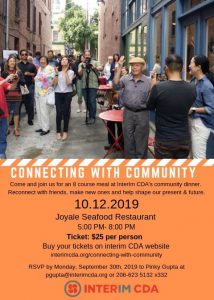
Come, join us to meet old and new friends for an evening of stories, games, food, and fun!
This is not a fundraiser but rather an opportunity to meet with old friends and hear stories of activism in ID.
Each table has 10 seats. Tickets can be purchased online. To buy your tickets, create an account or sign in here.
Event Details
What: Connecting with Community- Dinner
When: October 12, 2019; 5:00 - 8:00 p.m.
Where: Joyale Seafood Restaurant
900 S Jackson Street, Seattle, WA 98104
Ticket: $25 per person,
Registration: Create an account or sign in
For ticketing questions, email Pinky Gupta, pgupta@interimcda.org or call 206 624 5132 x 332
We hope to see you at the event!
